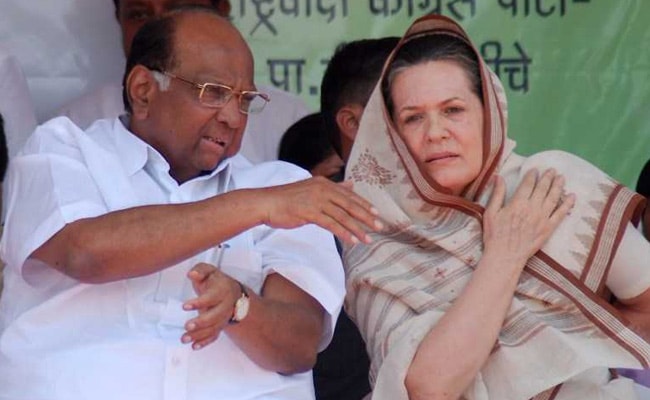The "maha" (giant) political mess in Maharashtra, which, 19 days after election results, has been placed under President's Rule, is a signifier of two things.
First, the opposition is now open to unlikely alliances to keep the BJP at bay. And second, regional imperatives are now driving the Congress party's decision-making away from the Gandhi family and the rootless leaders that make up the Delhi durbar of the party high command.
How the BJP lost the plot of accommodating regional allies is apparent from the fact that despite their pre-poll alliance, the Shiv Sena led by Uddhav Thackeray balked at forming a government with the BJP.

The Shiv Sena was ready to stake claim to power on Monday evening but for a last-minute pull-back by the Congress, which said it needed more discussions with the NCP
Thackeray prefers to navigate, instead, the uncertain, choppy waters of trying to form a government with parties who are at total ideological variance with the Sena.
This, despite the Sena-BJP alliance scoring a clear-cut majority and regardless of the three-decade all-weather alliance of the two parties. The Sena was the BJP's first ally, and no amount of spin by the BJP's embedded media can take away from the fact that the party was unable to form government in Maharashtra.
Thackeray's total disenchantment with the current leadership of the BJP is in spite of the fact that it jeopardises the Sena's control of the cash-rich Mumbai civic body. The Brihanmumbai Municipal Corporation (BMC) has a budget of more than Rs 30,000 crores and is the traditional source of Sena's strength.

BJP and Shiv Sena fell out over the Sena's insistence on a "50:50" arrangement in which it would have chief ministership for half the term
I spoke to a cross-section of leaders who are players in the Maharashtra imbroglio and they all pointed to how the BJP under Amit Shah has reduced politics to a zero sum game of winning at the cost of allies. Several leaders of the BJP also made the point that allies were upset at the misuse of investigative agencies against political rivals, even allies, to make them more "amenable". While every government at the centre has done this, it seems to have reached a nadir under the Modi government.
Sena leaders told me that Thackeray felt bullied and humiliated by the BJP in the past six years. Thackeray is upset that Shah unilaterally changed the rules of engagement with the Sena and reduced it to a junior partner. The Sena vote was being cannibalised by the BJP and Thackeray felt if he did not act now, the BJP would reduce the Sena to irrelevance in Maharashtra.
The BJP's other allies, such as the Janata Dal United in Bihar, are watching the Maharashtra alliance breakdown carefully and taking notes.

President's Rule was imposed in Maharashtra on Tuesday, after 20 days of meetings, tough negotiations and grand-standing by various parties yielded no government
The Maharashtra and Haryana (where the BJP tied up with a rival to form a government) results come six months after the BJP won a second term with an absolute majority. The results reveal politics is somewhat "normal" again (the BJP campaigned on the Article 370 decision), with bread and butter issues such as an imploding economy mattering again to voters.
The federal character of the polity in India has been underlined by these results for both the national parties. Congress leaders from Maharashtra told interim chief Sonia Gandhi that the party would split and it would be the end of the Congress in Maharashtra if they refused to support the Sena.
A canny Gandhi, who has always tried to build alliances, listened to the regional leaders and gave a reluctant go-ahead. Sharad Pawar, NCP chief, also told Gandhi that it was imperative to isolate the BJP even if it meant allying with the Sena.

NCP chief Sharad Pawar is reportedly keen on rotational chief ministership, given his party is just two seats behind the Sena
Several unelectable Congress leaders who make up the Congress Working Committee tried to counsel Gandhi against it but were overruled as 40 MLAs from Maharashtra weighed in favour of the alliance.
This indicates that the "hindutva" agenda, which was the glue that held the Sena and BJP together and kept the Congress at bay, is fraying. The Sena had grafted "hindutva" on the "Marathi manoos" ideological plank, yet it chose to break up with the BJP right after the favourable verdict on the Ram Mandir in Ayodhya.
While the Congress was squeamish about supporting the Sena, it seems to have decided that containing and isolating the BJP in India's richest state is a more important goal.

Shiv Sena is still in negotiations with the Congress and Sharad Pawar's NCP to work out a political coalition capable of governing the state
As the BJP becomes the central pole of Indian politics, expect to see more unlikely ideological alliances in attempts to contain and isolate the party. That, says a senior Congress leader, is a good thing for a democracy.
So what next in Maharashtra? At this point even Chanakya would have a tough time predicting this political humdinger. But it can be safely said that the battle is on and India's canniest politician, Sharad Pawar, is making his trademark moves.
(Swati Chaturvedi is an author and a journalist who has worked with The Indian Express, The Statesman and The Hindustan Times.)
Disclaimer: The opinions expressed within this article are the personal opinions of the author. The facts and opinions appearing in the article do not reflect the views of NDTV and NDTV does not assume any responsibility or liability for the same.


